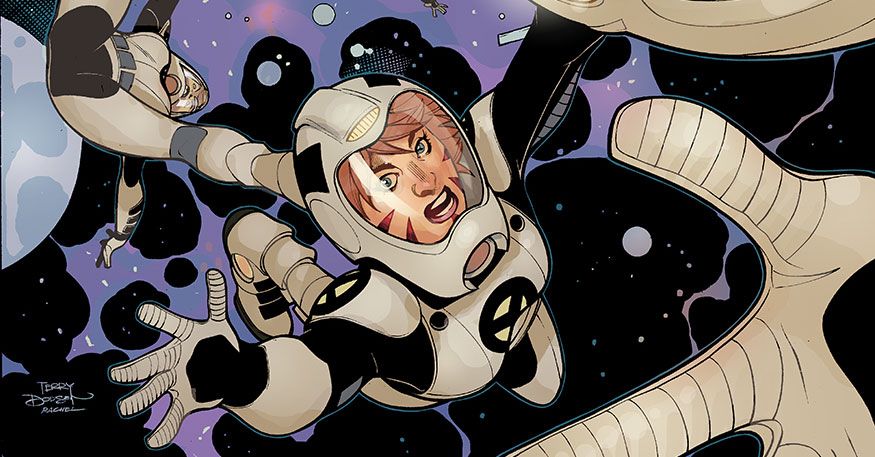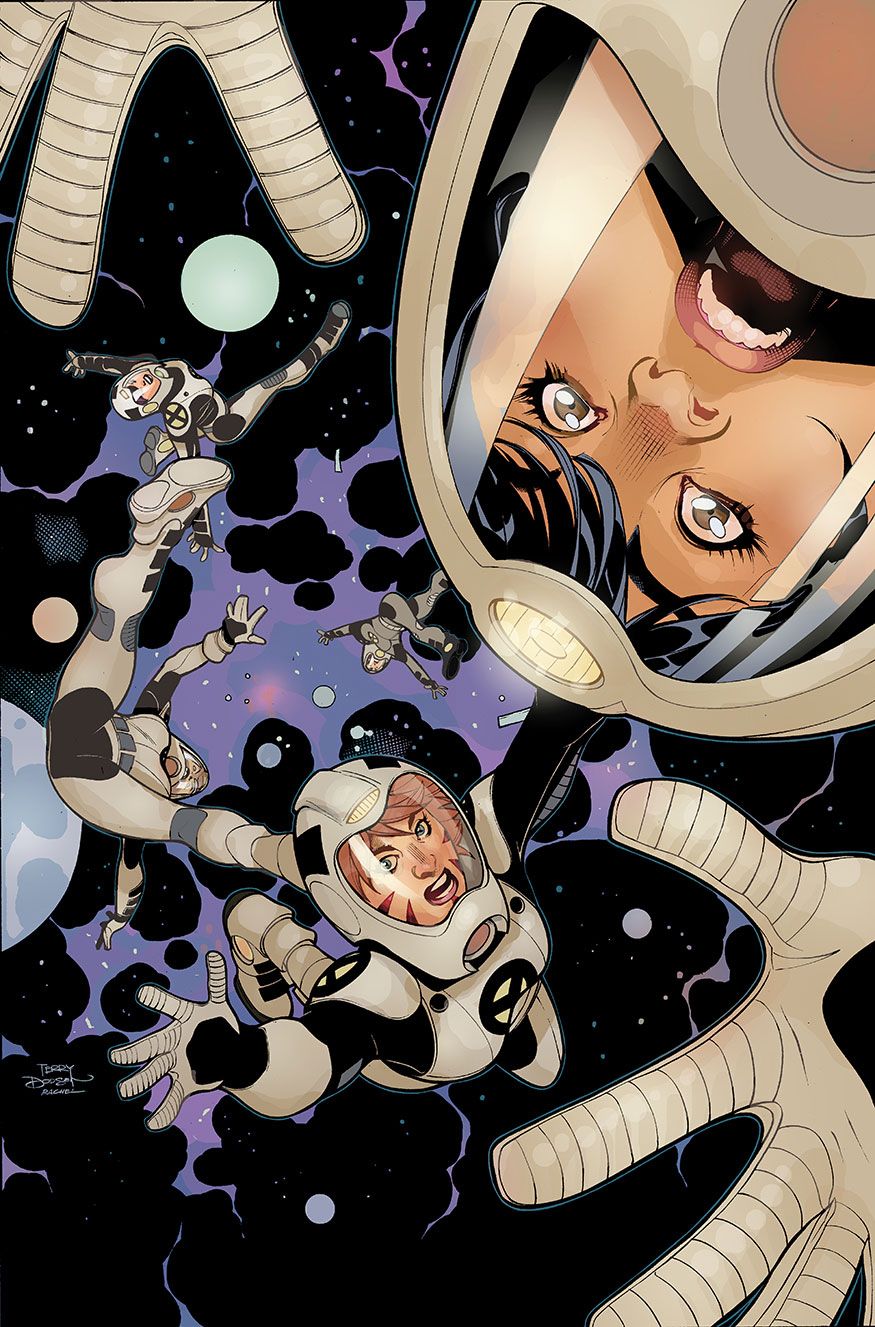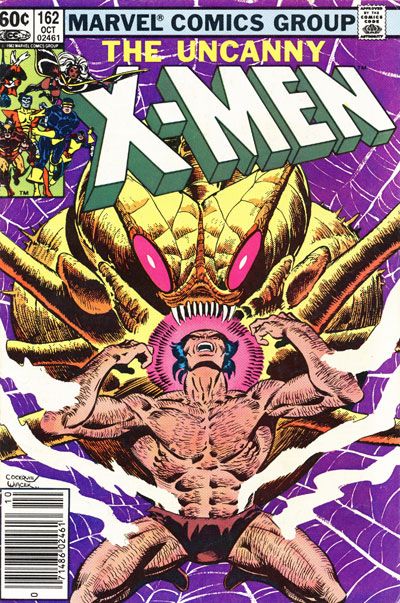As an executive producer on The CW's "Arrow," Marc Guggenheim has dedicated the past couple years to adapting the world of DC Comics to the small screen. Now that he's got some downtime -- "Arrow" season two wraps next Wednesday -- he's crossing the fictional universes and returning to Marvel for a writing gig on "X-Men," starting with August's issue #18.
Guggenheim has spent time in the X-verse before, writing "Wolverine" during "Civil War" and the "Young X-Men" series. This is his first time writing one of the core X-Men series, though, and he described it to CBR News as "the opportunity I've been dreaming about since I was a little kid." He's taking over "X-Men" from Brian Wood, the initial writer of this volume, which features an all-female main cast -- something that will remain in Guggenheim's run. His arc is scheduled for four issues, with an artist not yet announced.
CBR News spoke to Guggenheim about his plans for "X-Men," the classic story that inspired his cosmically bent arc, the "core strength" of Deathbird, Rachel Grey's emotional role and his desire to keep writing comics no matter how busy his TV schedule may get.
CBR News: Marc, obviously you've been busy the past couple years working on a certain television show, with not a ton of free time to write comic books -- how did you end up writing the ongoing "X-Men" book at Marvel?
Marc Guggenheim: We were bringing the second season of "Arrow" in for a landing, and it happened to coincide with a couple of things. It coincided with the fact that I was really jonesing to write some more comic books -- I hadn't done it in a while. I had done a little bit on the DC digital side, but I was really jonesing for it, and I was really jonesing for the Marvel Universe, because I spend a lot of my time in the DC Universe. At the same time, [Marvel executive editor] Mike Marts was coming over, and someone had suggested that I reach out to Mike, and I remember that Mike had once reached out to me back when he was at DC, but I was under an exclusive at Marvel. The other fortuitous thing was Brian Wood had just informed them that he was going to be leaving "X-Men," so they had a need. So it was like several planets aligning all at the same time to give me the opportunity to pitch on "X-Men." I was very grateful for the chance.
Even though you have done a bit of comic book stuff recently, this sounds like this is your first meaty arc in a while.
That's a good way of putting it -- it's my first time-intensive thing [in a while]. Which is great. I love writing comics, and I particularly love the X-Men. I couldn't ask for a better return to comics.
You mention your love of the X-Men, and you've written in the X-world before, a few years back -- "Wolverine" and "Young X-Men." But this is your first significant time writing a core "X-Men" book -- is that an opportunity you had been hoping for?
Honestly, when I first broke into comics, writing one of the main X-Men books was on my bucket list -- or more accurately, my ultimate aspiration. I'm really flattered and honored to have this opportunity. This is definitely the opportunity I've been dreaming about since I was a little kid.
With your schedule, have you been able to keep up with the happenings of the current Marvel Universe as of late, or did you have to do a degree of catching up upon landing this gig?
Fortunately, I had been reading Brian's run anyway. I still read. The only thing I had to do was go back and re-read some stuff -- for example, Deathbird plays a large role in my arc, and one of the things that I had to do was refresh my memory on what happened to her in ["X-Men: Kingbreaker."] I remember that she had her neck broken, I remember that she ended up in the clutches of the Shi'ar, but the circumstances had been lost to the mists of time -- or at least, lost in my memory. I went back and re-read a chunk of stuff.
As a long-term X-Men fan, but someone who hasn't been writing in that world in quite a while, the current landscape is obviously different -- Wolverine having his own school, Cyclops going underground after being part of the Phoenix, the Original Five active in the current timeline. What about the current X-Men landscape is exciting and interesting to you as a writer?
I love how rich it is. I feel like in the last couple years the X-Men books overall have sort of embraced the idea that there's just a ton of mutants out there. Rather than try to limit the roster of the various X-books to five or six specific characters, there's a much greater sense of mutant community right now, thanks to the Jean Grey School. You really get the feeling that you could enter the halls of the Jean Grey School and see almost anybody. I love the width and depth of those character possibilities.
That's really just as a reader. Obviously, the arc is set in space, so I'm not spending a lot of time in the school itself. I'm trying to work with the lineup of the adjectiveless "X-Men" as Brian has established it. But as a reader, I love the opportunity to open up any X-Men books and see this world of possibility. It feels very appropriate for mutants -- the idea that you could have this school where anything can and does happen, and you can see characters who you haven't seen in years, and they're right at home, because they're literally at home. I like all that.
This specific X-Men book is a unique one, because it has an all-female cast, which has been the mission statement of its run up to this point. It looks like you're keeping that intact -- how significant is that aspect of the book to you?
What I love about the adjectiveless X-Men, as I guess I'm calling them now -- to me, they just happen to be X-Men, and they just happen to all be female. I think it's a testament to how the X-books have really always been written. Certainly, Chris Claremont set the tone -- he always wrote these incredibly strong female characters, and all the writers who have come after him have honored that tradition. Here we are several decades later, and it's completely possible to have an entire team constituted of only female members, and have it not feel forced, or not feel like a gimmick, because of course they're all X-Men, and of course they're all strong characters, because that's the way women have been written in the pages of the X-Men for literally hundreds of issues now.
It's not played up as a gimmick. It's, "These are the X-Men, and the ones in this comic all happen to be female."
I think you could very easily read several issues of the adjectiveless "X-Men," and just feel like you're reading an X-Men book, before it even dawns on you that, "Oh wait a minute, they're all women."
So the lineup will be pretty much the same as what's been seen in Brian Wood's run? Who figures big into your story?
Rachel, Storm, Psylocke, Jubilee and Monet. They're my core team that I'm using. Rachel probably provides the emotional throughline of the story. One of the things that I felt has been underdeveloped in past years is the fact that her entire family had been wiped out by the Shi'ar. I've seen her like, standing shoulder-to-shoulder with Shi'ar, and it was a subtextual thing more than anything else. I felt like there was incredible emotional opportunity to mine here with Rachel and the fact that there's an entire race of people who are responsible for her entire family being wiped out.
I didn't want to have the entire story be about some continuity that happened five, 10 years ago. I wanted the story to stand on its own feet -- and it does, but the emotional acknowledgement of what happened to her family is a very, very powerful thing. You don't need to have gone back and read Claremont's arc where this happened in order to appreciate my story, it's just another layer of emotion.
The story is set in space, it involves S.W.O.R.D. -- what motivated you to take a more cosmic approach with the story?
Purely coincidentally, around the same time when the opportunity to pitch on X-Men had come up, I had been re-reading the early Claremont issues on comiXology, in particular "The Brood Saga." I was like, "I feel like it's been a while since I've seen the X-Men in outer space, in a story specifically set in space," and I was sort of jonesing for it as a reader. That's what led me to think about setting an adjectiveless "X-Men" story in space.
Deathbird plays a major role in this. She's a character who hasn't been around in quite a few years, and certainly fits quite naturally into a space-set "X-Men" story -- what do you like about that character, and how did you land on her in being a part of this?
One of the things I noticed about Brian's run was not just that the team was largely female, but the antagonists were largely female. Once I hit upon the idea of an "X-Men" story set in outer space," Deathbird's the obvious choice, because she is a female villain who obviously comes from outer space. I was largely inspired, or at least was thinking about, "The Brood Saga," which really began with some very heavily involvement on the part of Deathbird. She just felt right.
I like the character a lot. I like the fact that she's just such a strong character. She's been through so many different things over the years, but no matter what her status has been -- whether she's palling around with Bishop, or whether she's getting married to Vulcan, or whether she's trying to kill her sister -- her core strength is always paramount. I think one of the great things about the adjectiveless "X-Men" book is, it's obviously all about strong women, so she just makes for a really good antagonist.
She's certainly had an interesting history, but you can say that about just about any X-Men character.
That's true. That's part of the fun of the X-Men -- you get to swim in these incredibly deep waters. I feel particularly lucky because I've been reading the X-Men for more years than I probably should mention. So all these characters are very familiar to me. I don't have to work that hard to get their voices down, or access what they sound like or what they act like . They're so well drawn, and they've been so well drawn for so many years, that it's relatively easy to step into those different sets of shoes.
You presumably don't have a ton of time to devote to comics -- how long are you on "X-Men" for?
I've signed on for a four-issue arc. My hope is to be doing more comic book work. I've heard through the grapevine that there are various gigs I've missed out on because people think I'm too busy. I hope this run will disabuse people of that notion -- I love doing comics, and I can always find time for it, because it's just so much fun.



